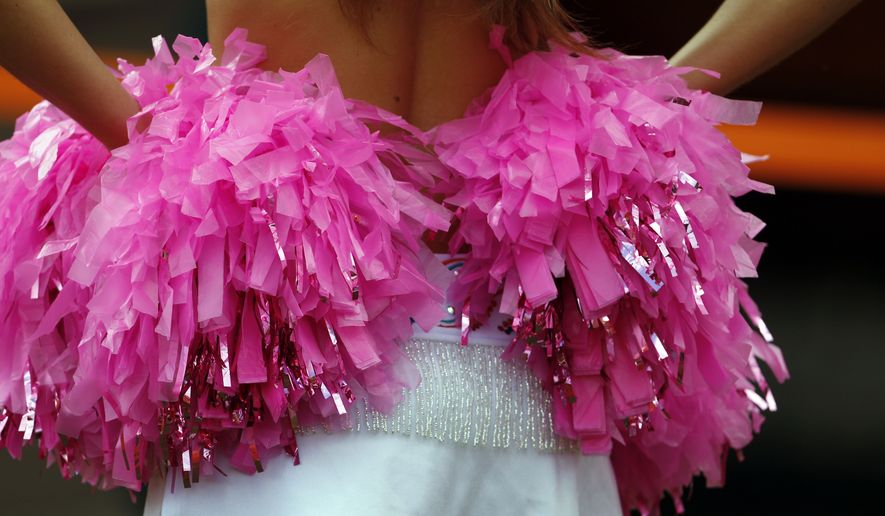The Biden administration has waded into a Supreme Court free-speech battle to side with a high school that kicked a foul-mouthed cheerleader off the JV team for using the F-word on Snapchat.
“F—- school f—- softball f—- cheer f—- everything,” raged the Pennsylvania teen who was upset about not making the varsity cheer squad.
Mr. Biden’s Justice Department argued that the First Amendment doesn’t shield student athletes from discipline by coaches and school officials, asking the justices to rule against the cheerleader’s First Amendment claim.
“Students who choose to join such teams reasonably should expect that if they engage in off-campus speech that intentionally targets their teammates or teams regarding matters essential to or inherent in the program, their speech might properly be considered school speech that coaches and team administrators could potentially discipline,” the DOJ lawyers wrote in court papers.
The federal government’s brief, submitted to the high court this week, said off-campus student speech is difficult to regulate but when it is spoken by a student-athlete or an individual engaged in extracurricular activities, it should be subject to punishment.
The free speech battle began when the cheerleader, identified only as B.L. in court papers, posted a photo of herself flipping the bird on Snapchat which appeared online for 24 hours, accompanied by the caption, “F—- cheer.”
The position taken by the Democratic administration puts it at odds with the progressive-aligned American Civil Liberties Union, which is representing B.L.
The ACLU said the high court has ruled in cases dating back decades that school officials can only punish student speech when it is substantially disruptive or threatening.
“The notion that a school can discipline a student for that kind of spontaneous, non-threatening, non-harassing expression is contrary to our First Amendment tradition, and finds no support in this Court’s student speech cases,” the ACLU said in court papers.
Angry over not making the varsity squad heading into her sophomore year, B.L. blasted out the uncensored Snapchat post while out shopping on the weekend with a friend.
She did not have on a school uniform in the image or mention the school’s name.
When Mahanoy Area School District officials became aware of the post, they ruled it violated school policy requiring cheerleaders to avoid “foul language and inappropriate gestures.”
The high school then removed her from the cheer squad, prompting her parents to sue. They argued that the school violated their daughter’s First Amendment rights.
“As a parent, I know that sometimes kids do foolish things. But when my daughter is on her own time and out of school, it’s my role as a parent to address her behavior. In this situation, I did that and felt that the school overstepped its bounds,” said Larry Levy, B.L.’s father.
“We’re in this case because we don’t want to see schools have the power to discipline students for what they do on their own time. Leave that authority to parents,” he said.
They first filed suit in 2017 and won in the lower courts and their daughter was reinstated on the squad.
B.L. has since graduated from high school but her Snapchat post could still create a legal standard for student speech in the digital age.
The Supreme Court decided to review the case after the school district appealed. The district argued the 3rd U.S. Circuit Court of Appeals ruled for the cheerleader in contrast to other federal courts across the country.
Five other federal appellate courts considered similar student-speech cases and ruled that a school may discipline off-campus speech if it has a nexus to the classroom.
“Teachers and administrators within the Third Circuit will henceforth be subject to money damages in civil rights suits for addressing off-campus speech that schools in other circuits routinely proscribe to avoid substantial disruptions to the school environment,” said the lawyers for Mahanoy Area School District.
The Biden administration said the court of appeals’ ruling “would lead to arbitrary results.”
“That categorical rule also could substantially undermine efforts by schools to address harassment and bullying, much of which might take place off campus but which nevertheless could deprive victims of equal educational opportunities,” the Justice Department said.
The leading student-speech precedent comes from the landmark 1969 case, Tinker v. Des Moines Independent Community School District. The legal dispute arose when a group of students decided to wear black armbands as a political statement about the Vietnam War.
They were suspended for wearing the armbands in violation of school rules, but the Supreme Court famously ruled for the students, saying they do not “shed their constitutional rights to freedom of speech or expression at the schoolhouse gate.”
Ilya Shapiro, the publisher of the Cato Institute’s Supreme Court Review, said the high court’s justices likely granted the school’s appeal in B.L.’s case to “clarify the law in this growing area of litigation.”
The court has not yet set a date for oral arguments in B.L.’s case.
• Alex Swoyer can be reached at aswoyer@washingtontimes.com.




Please read our comment policy before commenting.